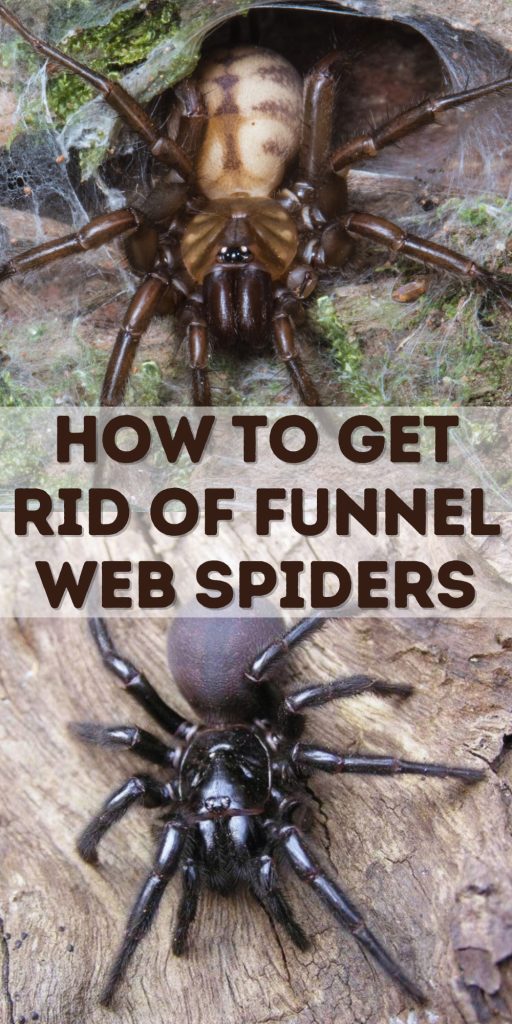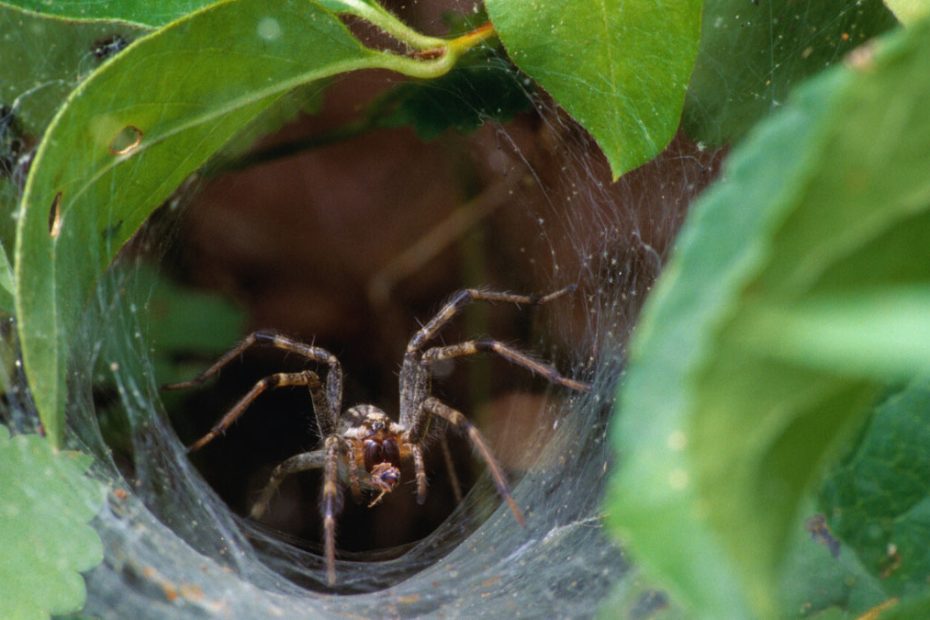Funnel web spiders can be a real menace, especially if you live in areas where they’re common. These aggressive arachnids can pose a significant threat due to their potent venom. Knowing how to effectively get rid of them is crucial for your safety and peace of mind.
You don’t need to be an expert to tackle this issue. With the right strategies and tools, you can make your home less inviting for these unwelcome guests. Follow along as we explore practical steps to keep your living space spider-free.
Key Takeaways
- Identification: Recognizing funnel web spiders is crucial; they have glossy, black or brown bodies and create distinctive funnel-shaped webs in moist, sheltered areas.
- Health Risks: Their venom is potent and can cause severe symptoms, making immediate medical attention essential if bitten.
- Preventive Measures: Maintain a clean yard, seal entry points, reduce clutter, and use appropriate pesticides to prevent these spiders from entering your home.
- Removal Methods: Use home remedies like essential oils, diatomaceous earth, or vinegar solutions; for larger infestations, consider chemical treatments or professional extermination services.
- Preventing Infestations: Regularly maintain your home by sealing cracks, removing debris, and using natural deterrents like essential oils and diatomaceous earth to keep spiders at bay.
- Emergency Actions: If bitten, stay calm, immobilize the affected area, apply a pressure immobilization bandage, and seek emergency medical attention promptly.

Understanding Funnel Web Spiders
Understanding funnel web spiders ensures you effectively eliminate them. These arachnids, native to Australia, pose significant risks due to their venom.
Key Characteristics
- Appearance: Funnel web spiders are typically black or brown with a glossy carapace.
- Size: Most measure between 1.5 to 3.5 cm in body length.
- Habitat: They prefer moist, sheltered areas like gardens or under rocks.
- Web Structure: Their webs are funnel-shaped, with a retreat funnel leading to a central lair.
Venom Potency
Funnel web spider venom contains neurotoxins that can cause serious health issues. Bites can lead to symptoms such as muscle spasms, breathing difficulties, and severe pain. Immediate medical attention is crucial if bitten.
Identifying Funnel Web Spider Infestations
- Webs: Look for distinctive funnel-shaped webs, especially in dark, damp areas.
- Spiders: Spotting the spiders themselves is a clear indication.
- Droppings: Small, dark droppings near webs may indicate an infestation.
Preventive Measures
You can take several steps to reduce the risk of funnel web spiders entering your home:
- Yard Maintenance: Keep your yard clean and free of debris.
- Sealing Entrances: Seal cracks and gaps in windows and doors.
- Clutter Reduction: Remove clutter from indoor and outdoor spaces to eliminate hiding spots.
- Pesticides: Use appropriate pesticides around your homeâs perimeter.
Understanding these elements helps you take effective action against funnel web spiders, ensuring a safer living environment. Keep monitoring and maintain cleanliness to minimize risks further.
Signs of Funnel Web Spider Infestation
Knowing the signs of a funnel web spider infestation helps you take proactive measures. Recognize these indicators to spot infestations early.
Web Characteristics
Funnel web spiders create distinctive webs. Their webs often feature a funnel shape with a narrow opening leading to a wider platform. You’ll typically find these webs in moist, sheltered areas, like under logs, rocks, or garden debris.
Behavioral Patterns
Funnel web spiders exhibit specific behaviors that help identify their presence. These spiders are nocturnal, often emerging at night to hunt or move around. They can be aggressive if disturbed. You might find them inside shoes, moist areas, or any other dark, cool environment within your home.
Effective Methods to Get Rid of Funnel Web Spiders
Getting rid of funnel web spiders involves a combination of home remedies, chemical treatments, and professional services. Each method offers different levels of effectiveness depending on the severity of the infestation.
Home Remedies
Home remedies can be a practical first step. These methods use common household items or natural ingredients.
- Essential Oils: Oils like peppermint, tea tree, and lavender can repel spiders. Mix 10-20 drops with water in a spray bottle. Spray around windows, doors, and other entry points.
- Diatomaceous Earth: This natural powder dehydrates spiders. Sprinkle around the perimeter of your house and in cracks where spiders may enter.
- Vinegar Solution: Mix equal parts of vinegar and water. Spray this solution directly onto spiders or their webs. The acidity effectively eliminates them on contact.
Chemical Treatments
Chemical treatments can be more effective for larger infestations. These treatments use pesticides and insecticides specifically formulated to kill spiders.
- Aerosol Sprays: Spider-specific aerosol sprays can be applied directly to spiders and their webs. Seek sprays containing pyrethroids, an active ingredient effective against spiders.
- Residual Insecticides: These offer long-term solutions. Apply residual insecticides to baseboards, corners, and other spider-frequented areas. They leave a lasting chemical barrier that kills spiders on contact.
- Spider Baits: Spider baits attract and poison spiders. Place these in dark, hidden areas where spiders are likely to travel.
Professional Extermination Services
For severe infestations, professional extermination services guarantee comprehensive spider control.
- Inspection and Assessment: Professionals inspect your home to identify the extent of the infestation. They locate nests and entry points.
- Customized Treatment Plans: Exterminators develop a tailored plan, often combining chemical treatments and preventive measures.
- Follow-Up Services: Many services include follow-ups to ensure the spiders are gone. Regular inspections help prevent future infestations.
Taking immediate action ensures your living space remains safe and comfortable. Consider the severity of your situation to choose the most appropriate method. Regular monitoring and maintenance can also help keep funnel web spiders at bay.
Preventing Future Infestations
Eliminating funnel web spiders from your home doesn’t end with eradication. Ensuring they don’t return is equally important. Carry out strategic measures to keep your living space safe and spider-free.
Home Maintenance Tips
Regular home maintenance plays a critical role in preventing funnel web spiders from invading your space. Employ the following steps:
- Seal Entry Points: Inspect and seal cracks and gaps around windows, doors, and foundation. Use caulking or weather stripping to close any openings.
- Remove Debris: Keep your yard free from leaves, wood piles, and other debris. Funnel web spiders are attracted to these sheltered, moist areas.
- Proper Storage: Store items in sealed containers rather than cardboard boxes, which can harbor spiders. Keep your garage, attic, and basement clutter-free.
- Outdoor Lighting: Use yellow or sodium vapor light bulbs outdoors. These attract fewer insects, reducing the spider’s food source.
- Trim Vegetation: Keep shrubs and branches trimmed away from your house. Overhanging vegetation can provide a bridge for spiders to enter.
Natural Deterrents
Carry out natural deterrents to create an unwelcoming environment for funnel web spiders:
- Essential Oils: Use oils like peppermint, eucalyptus, and tea tree. Mix a few drops with water in a spray bottle and apply to entry points and hidden corners.
- Vinegar Solution: Combine equal parts of vinegar and water. This solution can be sprayed around the perimeter of your home and in potential hiding places.
- Diatomaceous Earth: Spread this natural powder in gardens, around foundations, and in cracks. It dehydrates spiders, deterring them naturally.
- Chestnuts: Place chestnuts in corners, windowsills, and other entry points. Some believe the scent repels spiders.
Preventing future infestations requires consistent effort in maintaining cleanliness and using natural deterrents. By integrating these practices, your home can remain a safe, spider-free zone.
What to Do if You’re Bitten
A funnel web spider bite requires swift action due to the potential severity of its effects. Follow these clear steps for immediate response and further medical care:
- Remain Calm: Staying calm helps manage symptoms. Panicking can increase your heart rate, spreading the venom faster.
- Immobilize the Affected Area: Keep the bitten limb as still as possible. Venom travels more slowly through a limb that isn’t moving.
- Apply a Pressure Immobilization Bandage: Wrap a bandage around the bite site and extend it up the limb. The bandage should be snug but not so tight that it cuts off blood flow.
- Seek Emergency Medical Attention: Contact emergency services immediately. Describe the bite details to ensure appropriate antivenom is administered.
- Avoid Medications: Unless advised by a healthcare professional, avoid taking any medications, especially aspirin, which can exacerbate bleeding.
Key Actions
- Mark the Time: Noting the time of the bite helps medical personnel assess the progress and administer the correct treatment.
- Monitor Symptoms: Track symptoms like swelling, pain, and breathing difficulties. Report these to medical staff for accurate assessment.
What to Expect
Medical Response: Hospital treatment typically includes antivenom. Antivenom administration is crucial if bitten by a funnel web spider.
Recovery Time: Follow-up care may include monitoring in a hospital for a few days, depending on the severity.
By remaining calm, immobilizing the bitten area, and seeking prompt medical help, you can effectively manage and treat funnel web spider bites.
Conclusion
Getting rid of funnel web spiders requires a combination of knowledge, preventive measures, and effective treatments. By understanding their habits and characteristics, you can better identify and tackle infestations. Implementing preventive strategies like sealing entry points and maintaining a clean yard will make your home less inviting to these dangerous arachnids.
Don’t hesitate to use home remedies or chemical treatments for minor infestations, but seek professional help for severe cases. Regular monitoring and maintenance are key to ensuring a spider-free living space. Stay vigilant and proactive to keep your home safe and comfortable.
Frequently Asked Questions
What are the main dangers of funnel web spiders?
Funnel web spiders are highly venomous, with their bites containing neurotoxins that can cause severe health issues. Their aggressive nature also makes them a serious threat when encountered.
How can I identify a funnel web spider infestation?
Look for their distinctive funnel-shaped webs in moist areas such as under logs or garden debris. You may also spot the spiders themselves or find small, dark droppings nearby.
What preventive measures can I take to avoid funnel web spiders?
Maintain a clean yard, seal cracks in windows and doors, reduce clutter, and use appropriate pesticides around your home. Regular monitoring and cleanliness also help minimize risks.
What home remedies can help get rid of funnel web spiders?
Essential oils, diatomaceous earth, and vinegar solutions are practical options for initial spider control. These natural remedies can deter spiders from taking up residence in your home.
When should I consider chemical treatments or professional services?
For larger infestations, use chemical treatments like aerosol sprays, residual insecticides, and spider baits. For severe cases, professional extermination services provide comprehensive control and follow-up.
What should I do if I get bitten by a funnel web spider?
Remain calm, immobilize the affected area, apply a pressure immobilization bandage, and seek emergency medical attention immediately. Monitoring symptoms and noting the time of the bite are also crucial.
How can I prevent future funnel web spider infestations?
Seal entry points, remove debris, store items properly, use outdoor lighting that attracts fewer insects, and trim vegetation away from your house. Natural deterrents like essential oils and chestnuts can also help.
